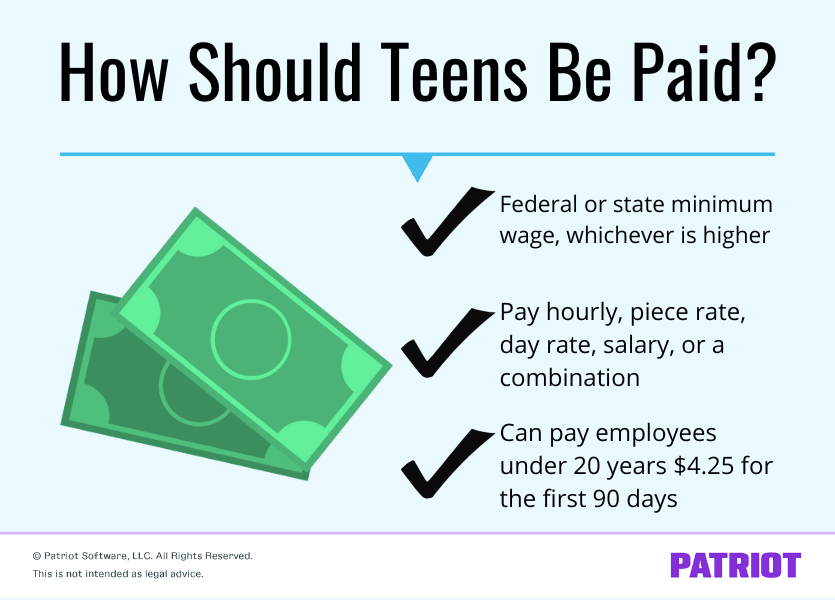The closer summer gets, the more teens begin looking for jobs—and, they might be applying to work for you. The Fair Labor Standards Act (FLSA) sets specific rules for hiring teens and children. Know the minor employment laws before you take on a minor employee. To learn more about the labor laws for minors seeking summer jobs, check out our study guide.
Labor laws for minors
The FLSA sets strict standards for minors entering the workforce, including industries allowed, workable times and hours, and safety requirements. Regulations for minor employees depend on the minor’s specific age and determine the legal age to work.
Employers with minor workers must post the FLSA Minimum Wage Poster, which lists minimum age requirements. Post this information somewhere in the workplace that all employees can see it.
Labor laws for minors are designed to protect minor employees. So, what are the child labor laws?
Minors under 14 years old
There are two types of jobs the FLSA classifies for minors—agricultural and non-agricultural. Each industry carries its own rules and regulations for teen employment.
Agricultural
The FLSA rules limit the work for minors under the age of 12 to any non-hazardous job on a small farm that is exempt from federal minimum wage provisions. Children must have parental consent to work. They may only work outside of their school district’s school hours.
Minors under 14 years old can work any non-hazardous job as long as their parent or guardian works on the farm or gives consent. Teen labor laws state minors of any age can work any time for any job on a farm their parent or guardian owns or operates.
Non-agricultural
For minors under the age of 14, workable jobs are limited if the industry is non-agricultural. Minors under 14 years can take the following jobs in non-agricultural industries:
- Newspaper delivery
- Babysitting
- Acting or performing in movies, TV, radio, or theater
- Working as a homeworker gathering evergreens and making evergreen wreaths
Children under 14 years of age can also work in a business owned entirely by their parents. The job must not be mining, manufacturing, or any other job listed in the FLSA’s 17 hazardous occupations.
Minors 14 to 15 years old
Like minors under 14, federal labor laws define the scope of work available to 14- and 15-year-old minors into agricultural and non-agricultural.
Agricultural
How many hours can a minor work? Minors aged 14 and 15 can work outside school hours in their resident school district. For minors who are homeschooled, go to private school, or do not attend school, the hours are based on the public school. The job must not be a hazardous agricultural job by Secretary of Labor standards.
Non-agricultural
Non-agricultural work for minors aged 14 and 15 is limited, especially with how many hours the minor can work. These minors may not work:
- More than three hours per day on school days, including Fridays
- Over 18 hours a week when school is in session
- More than eight hours per day when school is not in session
- More than 40 hours a week when school is not in session
- Before 7:00 a.m. or after 7:00 p.m. (after 9:00 p.m. between June 1 and Labor Day)
The work is limited to:
- Retail occupations including cashiering, selling, price marking, packing, and shelving
- Creative or intellectual work (e.g., tutoring, singing, or computer programming)
- Delivery work by foot, bicycle, or public transportation
- Yard work that does not include electric equipment (e.g., power-driven mowers or trimmers)
- Kitchen and food service work (e.g., washing dishes or reheating food)
- Some work involving cars and trucks, including dispensing gasoline or car washing
- Cleaning produce, wrapping, labeling, weighing, pricing, and stocking of items only in areas separate from a freezer or meat cooler
- Loading or unloading work-site objects such as rakes or shovels
Employees in this age group must meet specific requirements before they can perform limited tasks in woodshops or sawmills.
Fifteen-year-olds can be lifeguards if they meet the requirements. They can only work at traditional swimming pools and amusement parks.
Minors 16 to 18 years old
Once a minor is 16 years old, the work they can perform is less limited.
Agricultural
Sixteen-year-old employees can perform any job at any farm, at any time. There are no hour or hazardous job restrictions for minors 16 or older.
Non-agricultural
So, how many hours a week can a minor work in non-agricultural jobs? As long as a job is not declared hazardous by the Secretary of Labor, 16- and 17-year-olds can work an unlimited number of hours in any job. Some examples of hazardous and prohibited jobs for 16- and 17-year-olds include:
- Roofing work
- Trenching and excavating
- Brick, tile, and related product manufacturing
- Mining in coal, metal, and aggregate, including quarries and sand and gravel operations
Operating power machinery for the following is also listed as hazardous and disallowed by the Secretary of Labor:
- Metal-forming, punching, or shearing
- Meat-processing machines, such as those used at meatpacking plants
- Meat slicers, saws, or meat choppers in all industries, including restaurants
- Bakery machinery such as dough or batter mixers or rollers
- Balers, compactors, and other power paper-product machines
- Circular or band saws, wood chippers, chainsaws, guillotine shears, and abrasive cutting discs
- All hoisting machines, including forklifts, scissor lifts, man lifts, and cranes
Minor employment laws on pay
The FLSA has strict rules on how teens should be paid. You must pay minors at least the federal minimum wage of $7.25 per hour. Some states have a minimum wage that is higher than the federal minimum wage. If your state has a higher minimum wage, pay the state minimum wage.

You may pay minor employees in a variety of ways, including:
- Hourly
- Piece rate
- Day rate
- Salary
- A combination of the other rates
The combination of other rates must average out to the hourly minimum wage.
For employees under 20 years old, you can pay $4.25 per hour for the first consecutive 90 days of employment.
The FLSA does not require that employees in the agricultural industry receive overtime for hours worked over 40 in a workweek.
Under certain circumstances, employers may pay below the minimum wage. Employers should check with the Department of Labor Wage and Hour Office to determine if they meet the requirements.
Paying teen employees should be as easy as 1-2-3. With Patriot’s online payroll, you can easily enter in hours, review, and approve. We do the math for you so you can pay your employees and get back to business. You can easily track your teen employee’s hours with our time and attendance add-on, too! Try it free for 30 days.
This article has been updated from its original publication date of December 2, 2014.
This is not intended as legal advice; for more information, please click here.


